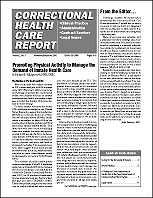Legal Developments
Author: Margaret R. Moreland, J.D., M.S.L.S..
Source: Volume 10, Number 04, May/June 2009 , pp.53-55(3)

< previous article |next article > |return to table of contents
Abstract:
In Bertrand v. Department of Corrections , 2008 U.S. Dist LEXIS 28599 (M.D. Pa. March 20, 2008), the district court for the Middle District of Pennsylvania examined the issues regarding an inmate’s right to medical privacy. Louis Tatta, a New York State inmate, filed a complaint with the Court of Claims alleging that a nurse administrator at the facility where he was incarcerated had disclosed his confidential medical information without his consent. The disclosure was made in connection with the investigation of a grievance that Tatta had filed in November 2004. At that time he was objecting to a decision not to provide him with a prescribed medication. When Is Expert Testimony Required? Michael Bias was incarcerated at the Allred Unit of the Texas Department of Criminal Justice (TDCJ) and under the care of a psychiatrist when his suicide attempt on May 20, 1997 rendered him unconscious. Expert testimony is not always necessary to show that serious medical risks have been disregarded.Keywords: HIV, Hepatitis C, Grievance Resolution Committee, deliberate indifference, negligence, overdose
Affiliations:
1: Pace University School of Law Library.